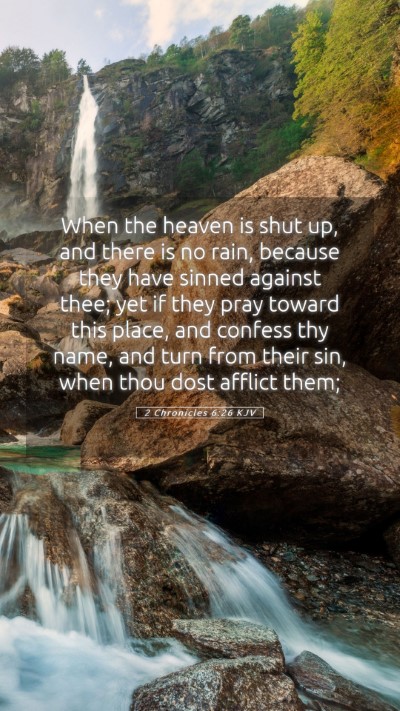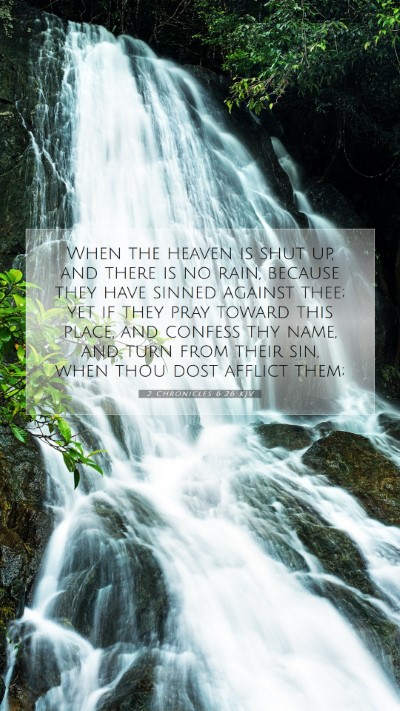Bible Verse Explanation: 2 Chronicles 6:26
Verse: "When the heaven is shut up, and there is no rain, because they have sinned against thee; yet if they pray toward this place, and confess thy name, and turn from their sin, when thou dost afflict them;" - 2 Chronicles 6:26
Overview of 2 Chronicles 6:26
2 Chronicles 6:26 speaks to a moment of intercession and repentance that recognizes God’s sovereignty over the natural elements as a response to the disobedience of His people. The verse highlights an essential principle of biblical faith: the link between sin, divine judgment, and the path to restoration through prayer and repentance.
Meaning and Interpretation
This verse underscores the serious consequences of sin leading to divine judgment, specifically illustrated through the withholding of rain, which represents God's provision and blessing. The absence of rain can be understood both literally and figuratively; it symbolizes spiritual dryness and the consequences of turning away from God.
- Repentance: The verse emphasizes the importance of acknowledging sin and confessing it before God. True repentance involves a heartfelt turning away from sin, and this is fundamental in biblical teachings.
- Prayer: Emphasizing prayer as a powerful action that brings believers into communion with God. This highlights that prayer in the direction of God's dwelling place (the temple) is an act of faith and reliance on God's mercy.
- God's Grace: The latter part of the verse offers hope, affirming that if the people turn to God in their affliction, He is willing to restore them. This demonstrates God’s desire for reconciliation.
Insights from Commentaries
Matthew Henry's Commentary
Matthew Henry emphasizes the conditional aspect of God's mercy. He notes that even when divine judgments are evident, there is an avenue for restoration through sincere prayer and repentance. This reinforces the understanding that God is always ready to hear those who return to Him.
Albert Barnes' Notes
Albert Barnes highlights the connection between national sin and disaster, explaining how the withholding of rain serves as a direct consequence of the people's failure to adhere to God's commandments. His commentary points out that divine justice serves a purpose: to draw the people back to God through recognition of their faults.
Adam Clarke's Commentary
Adam Clarke presents a theological insight into the symbolism of rain as both physical nourishment and a representation of divine favor. He notes that a prayerful return to God serves not only for individual restoration but also has implications for the community as a whole, illustrating corporate responsibility in seeking God’s grace.
Cross References
This verse resonates deeply with several other biblical passages that illustrate similar themes of sin, judgment, and the hope of restoration:
- Deuteronomy 28:23-24: A warning about the consequences of disobedience leading to a lack of rain.
- 2 Chronicles 7:14: God's call for humility, prayer, and turning from sin as a pathway to healing the land.
- 1 Kings 8:35-36: Solomon appealing to God for mercy during drought as part of his prayer at the dedication of the temple.
Application in Daily Life
This verse invites believers to consider their own lives and the corporate life of the community. Key applications include:
- Self-Examination: Regularly reflecting on personal and communal actions in light of God's standards.
- Commitment to Pray: Emphasizing the necessity of prayer in times of distress or divine judgment.
- Acknowledgment of God's Sovereignty: Recognizing God’s control over all aspects of life and responding with trust and obedience.
Conclusion
2 Chronicles 6:26 serves as a powerful reminder of God's justice and mercy. It calls believers to engage in sincere prayer and repentance in response to sin. Whether in personal study or group discussions, this verse encourages deep reflection on the dynamics of sin, judgment, and the transformative power of turning to God.


